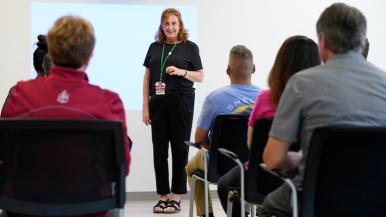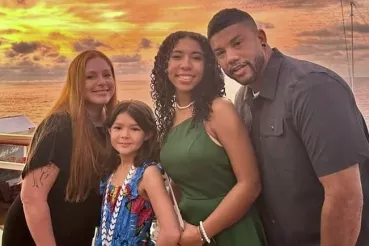When Modie Lavin joined the outreach team at the Road Home Program in 2015, the flagship accelerated brain health program — formerly known as the Intensive Outpatient Program — did not yet exist. There were fewer than 20 employees in about half of the program’s current space, with a steady stream of outpatient activity.
She leveraged her experience launching recreational programs for veterans at the Chicago Park District and her wide network to develop events and activities that complemented Road Home’s clinical offerings.
“They saw my impact in the community and thought I’d be a good fit,” explained Lavin, who currently serves as senior outreach coordinator for Road Home. “I was looking for an opportunity to help veterans and their families on a deeper level.”
Around the time Lavin started, U.S. Army veteran Juan Sanchez was receiving outpatient care at Road Home. He returned from the war in Iraq with unprocessed trauma that made it difficult for him to be the father he wanted to be.
When he was ready to process his trauma, Sanchez felt the VA couldn’t offer him what he needed. Road Home could, first through its outpatient services and then as part of its accelerated treatment pilot — which was held in the main hospital. At the time, there was no dedicated space for the program.
Despite the care he received, Sanchez spent a lot of his free time alone. Programs like the ones Lavin designed got him out of the house to “get connected with other veterans” and feel a little less lonely.
“It’s people like Modie, a Gold Star Mother, who get us veterans,” Sanchez said. “We can be ourselves around them. It’s beautiful to have people like her in your corner.”
Lavin can empathize with veterans’ suffering and grief. Her son, U.S. Marines Cpl. Conner T. Lowry, was killed in action in Afghanistan in 2012.
“I flew out to Camp Pendleton for services and met some of Conner’s brothers and sisters in arms,” she recalled. “I saw very broken service members, and this motherly instinct to help them kicked in.”
Like most Road Home staff members, Lavin’s personal connection to the mission drives her to ensure each client receives the best possible care. This program-wide approach and mentality have informed Road Home’s comprehensive care model and defined its evolution.
‘More is not always better’
Just 15 years ago, the assumption was that once you had PTSD, it would impact your life so much you couldn’t function.
Road Home Research Director Philip Held, PhD, has spent the last 10 years chipping away at that belief and transforming how we view, study and address PTSD in the process. With each scientific discovery, services evolved and improved.
For instance, when Road Home piloted a two-week virtual program during COVID, it cut 40 clinical hours from care. On paper, that kind of change might appear as if it would negatively affect outcomes.
Dr. Held and his colleagues discovered quite the opposite.
“We reduced the amount of care but continued to see the outcomes, such as reduced PTSD symptoms — which we now know also persist over time,” he said. “So not only do you get better in a shorter amount of time, you stay better. More is not always better. What matters is the type of treatment you receive.”
As soon as the Road Home transitioned back to in-person care, clinicians implemented the two-week program. Even with this switch, Road Home and its services just keep growing.
More staff, a condensed program, more specialized treatments, telehealth options and consistent outcomes mean Road Home can continue to reach more veterans, active-duty service members and their families, who can expect similar results.
Meanwhile, a streamlined intake process has cut time to care by at least a month, so clients can access the services they need even faster. Even art therapy has scaled up from weekly one-hour sessions attended by a few people to monthly three- to six-hour-long sessions to promote community building and healing.
Lavin, who has watched these changes unfold, is constantly amazed.
“I’m so impressed with our clinical and research staff’s willingness to continue to improve upon something that I, from the outside looking in, already thought was perfect,” she said.
Dr. Held and his colleagues know there is room to keep refining and improving Road Home’s approach to deliver the best possible outcomes for the military community.
“One in four veterans does not experience a meaningful reduction in PTSD symptoms,” he said. “If we’re truly a National Center of Excellence, then we need to figure out how to support those individuals and help them feel better and stay better.”
Finding purpose and healing
Ten years and more than 50 peer-reviewed publications later, Road Home has shifted the paradigm on how to treat PTSD and changed perceptions of how long it takes for someone to feel better.
“There’s no cure for what I have,” Sanchez said. “Road Home showed me how I can co-exist with this trauma so I can live my life and not let it define me.”
According to Dr. Held, this mindset surrounding PTSD is new. It’s evolved, in part, because of Road Home’s ability to evaluate and modify the program in real time — with meaningful, life-changing effects.
"If you step back, it’s exciting,” Dr. Held said. “We’ve had an impact on the entire field. Even organizations such as the VA are adopting these accelerated treatment models as a direct result of the work we’ve done.”
Philanthropy has made the difference, he said. It allows Road Home to provide services at no direct cost to the military community and conduct studies that result in better care, which opens doors for clients to achieve their goals and live healthier lives.
“Because of the Road Home Program, I had the opportunity to be a father, which I didn’t have before because of the trauma,” Sanchez explained. “And even now, when I’m struggling, Road Home is there. I know I have the tools I need to keep me going.”
Lavin has seen these transformations in veterans like Sanchez — as well as several who served with Conner and received care. Over the years, she has traveled the country raising awareness about Road Home and its programs. She finds purpose and healing in this work. It’s a way to connect with military families, find peace and honor Conner’s life.
“I feel him lift me,” she shared, choking back tears. “He was a natural leader, and if he were still alive, he’d be helping veterans, too.”




